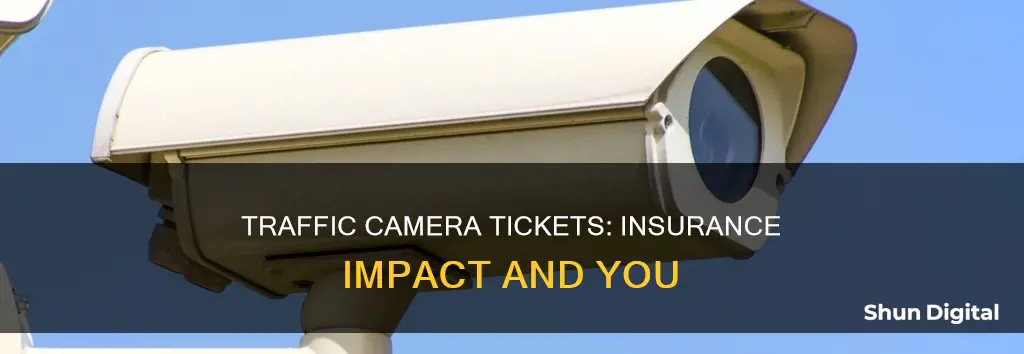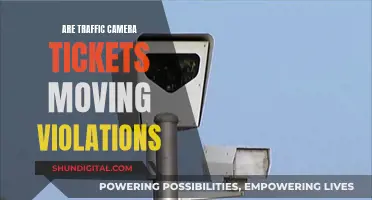
Traffic camera tickets, such as those issued for speeding or running a red light, are a cause for concern for many drivers, who worry that they will impact their insurance rates. In most states, these tickets are treated as non-moving violations, similar to parking tickets, and therefore do not affect insurance premiums. However, there are a few states where traffic camera tickets can result in points being added to a driver's license, which may lead to higher insurance rates. It's important to understand the laws and potential consequences in your specific state to know how these tickets might affect you.
| Characteristics | Values |
|---|---|
| Do traffic camera tickets affect insurance rates? | In most states, traffic camera tickets do not affect insurance rates. |
| Which states treat traffic camera tickets as moving violations? | Arizona, California, and Oregon. |
| Which states ban insurers from using traffic camera tickets to raise rates? | New York, North Carolina, and six other states. |
| Are there any states without traffic cameras? | Yes, fifteen states do not have red light or speeding cameras. |
What You'll Learn
- Red light camera fines are treated as non-moving violations in most states
- Camera speeding tickets are treated as non-moving violations in most states
- Red light camera tickets won't raise insurance rates in most states
- Camera speeding tickets won't raise insurance rates in most states
- Three states treat camera tickets as regular moving violations

Red light camera fines are treated as non-moving violations in most states
However, there are a few states that treat red light camera fines as moving violations. In these states, a red light camera fine is considered to be on the same level as a ticket for running a red light or speeding. These types of violations can result in points being added to your driver's license and can lead to increases in insurance rates.
The majority of states that have red light cameras treat the infractions as non-moving violations, which means that insurance rates will not be affected. However, it's important to note that there are a small number of states where red light camera fines are treated as moving violations, and in these states, insurance rates may be impacted.
In most cases, a red light camera fine will not result in any points being added to your driver's license or any increase in your insurance rates. However, it's always a good idea to be aware of the specific laws and regulations in your state, as there may be some variation. Additionally, while red light camera fines may not directly impact insurance rates, insurance companies take into account a variety of criteria when calculating prices, including driving history, age, gender, and more. So, while a single red light camera fine may not directly affect your insurance rates, it could be one factor among many that insurance companies consider when determining your overall risk profile.
The Evolution of Computer Cameras: How Are They Made?
You may want to see also

Camera speeding tickets are treated as non-moving violations in most states
In most cases, camera speeding tickets will only impact insurance rates if they put points on a driver's license or are added to their driving record. Currently, Arizona, California, and Oregon are the only states that treat camera speeding tickets the same as regular moving violations. In these states, camera speeding tickets can result in points on a driver's license and may lead to increased insurance rates.
It is important to note that even though camera speeding tickets may not affect insurance rates in most states, failure to pay the fine can have other consequences. In some cities, unpaid camera tickets can block vehicle registration renewal. Additionally, camera speeding tickets can still result in fines, and drivers may need to appear in court if they choose to dispute the ticket.
Mastering Manual Focus with Fuji Cameras
You may want to see also

Red light camera tickets won't raise insurance rates in most states
Red light camera tickets are generally treated as non-moving violations, similar to parking tickets, or tickets for an expired registration or a broken tail light. They are considered civil or administrative violations, which do not result in points and are not added to the driver's record. Therefore, in most states, red light camera tickets will not raise your insurance rates.
However, there are a few exceptions. In Arizona, California, and Oregon, red light camera tickets are treated as moving violations, and can result in points on your license and increases in your insurance rates. In Oregon, a red light camera ticket is considered a Class B traffic violation, which can result in a significant increase in insurance costs.
It's important to note that even if a red light camera ticket doesn't directly impact your insurance rates, it can still have other consequences. For example, you may have to pay a fine, and in some cases, the infraction may be added to your driving record. Additionally, some states may suspend your license if you receive a certain number of demerit points, which can indirectly affect your insurance rates.
To avoid any potential impact on your insurance, it's always best to obey traffic laws and be cautious when approaching red lights.
Airport Car Rentals: Are You Being Watched?
You may want to see also

Camera speeding tickets won't raise insurance rates in most states
However, there are a few exceptions. In Arizona, California, and Oregon, camera speeding tickets are treated as regular moving violations. These three states add points to your license for camera speeding tickets, which can lead to higher insurance premiums.
In addition, some insurers may raise rates for multiple speeding fines, even if they were captured by camera. On the other hand, other insurers may overlook a couple of minor speeding penalties, especially if you have a clean driving record.
It's worth noting that traditional speeding tickets, issued by a police officer, are typically considered moving violations and can result in increased insurance rates.
Reversing Car Cameras: Hardwiring for Safety and Peace of Mind
You may want to see also

Three states treat camera tickets as regular moving violations
In most states, traffic camera tickets are treated as non-moving violations, similar to parking tickets or broken tail light penalties. This means that they do not affect insurance rates. However, there are a few exceptions. In three states—Arizona, California, and Oregon—traffic camera tickets are treated as regular moving violations, and can therefore impact insurance premiums.
In Arizona, drivers receive two points for red light camera violations and three points for speeding camera violations. These points can lead to higher insurance premiums. California gives drivers one point for red light camera infractions, which can also impact future insurance costs. In Oregon, a red light camera ticket is considered a Class B traffic violation. Depending on the driver's insurance company and driving history, a single red light camera ticket in Oregon could increase insurance rates by 5% to 15%.
It is important to note that even in states where traffic camera tickets are not considered moving violations, receiving multiple tickets or having other violations on your record may still impact your insurance rates. Insurance companies take into account various factors when calculating premiums, including driving history, age, gender, and credit score.
Mastering Focus-Pulling: Tips for Camera Assistants
You may want to see also
Frequently asked questions
In most states, traffic camera tickets are treated as non-moving violations, similar to parking tickets, and do not impact insurance rates.
Red light camera tickets are generally not considered moving violations and do not go on your driving record. However, there are a few states that treat them as moving violations.
Insurance companies do not consider traffic camera tickets as seriously as speeding tickets or reckless driving citations, and they are not factored into rate calculations in most cases.
Yes, in Arizona, California, and Oregon, traffic camera tickets can result in points on your license, which may lead to higher insurance premiums.
You can either pay the fine or contest the ticket. Paying the fine will not directly affect your insurance rates, but it is important to check with your specific state and insurance company to understand their policies.







